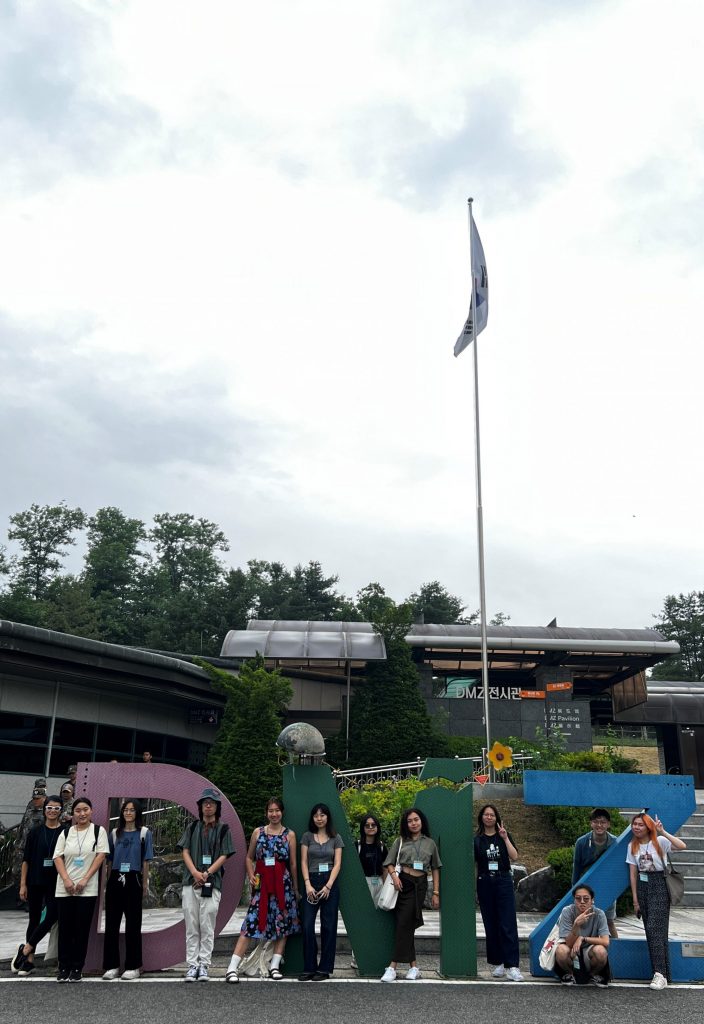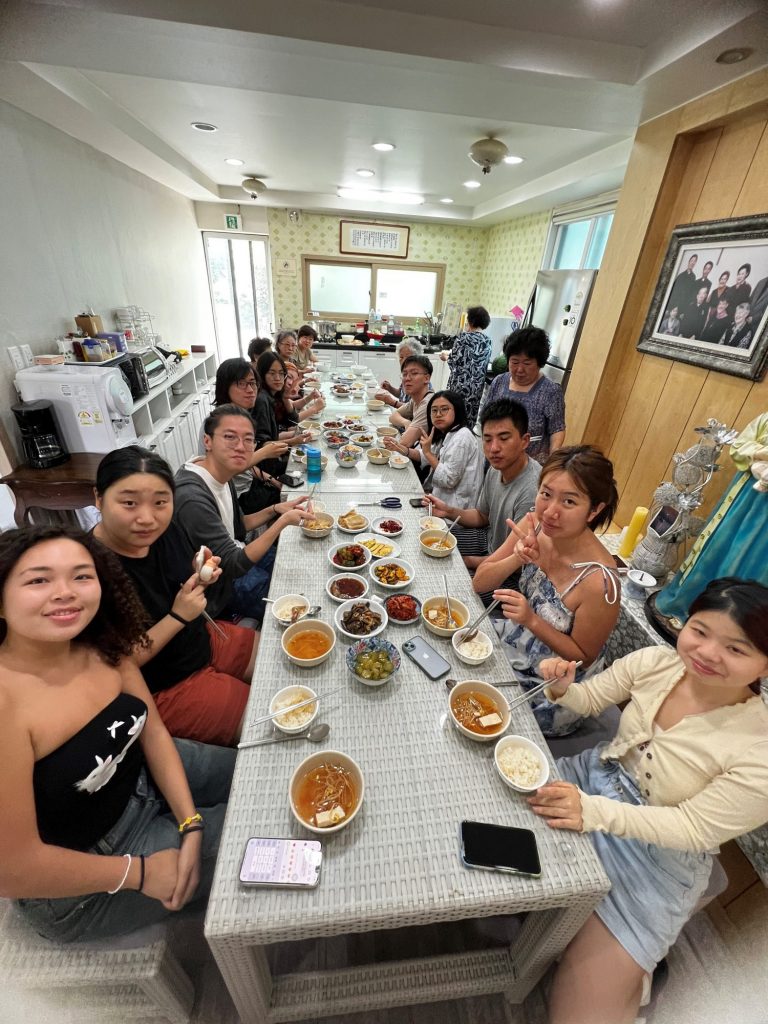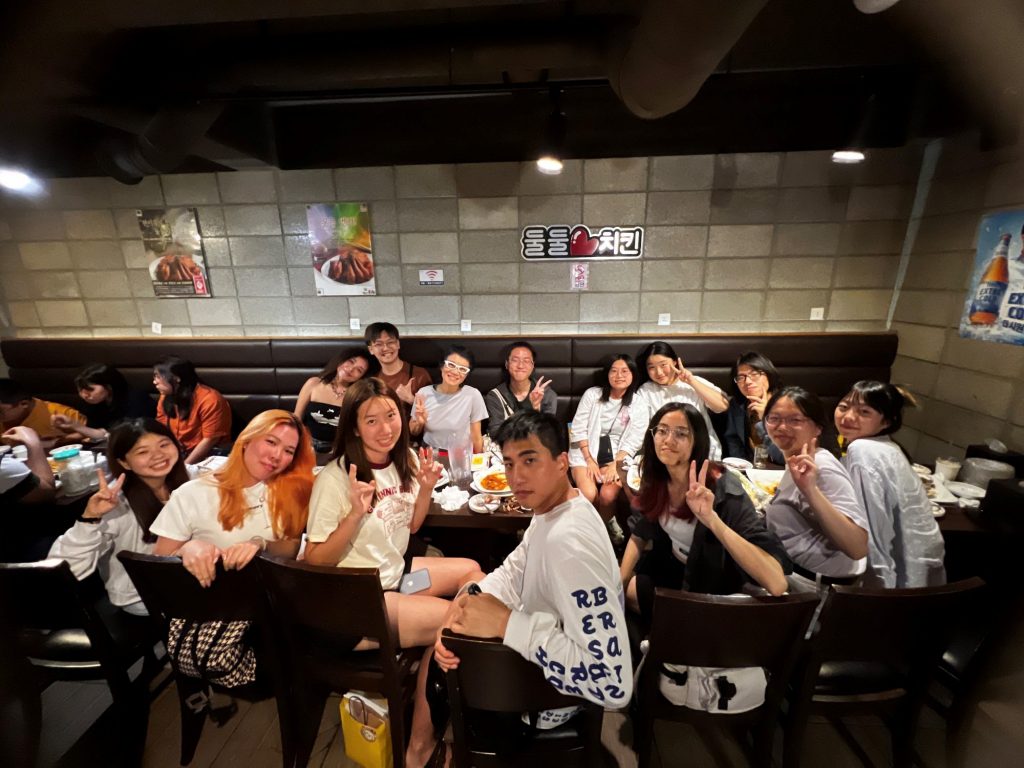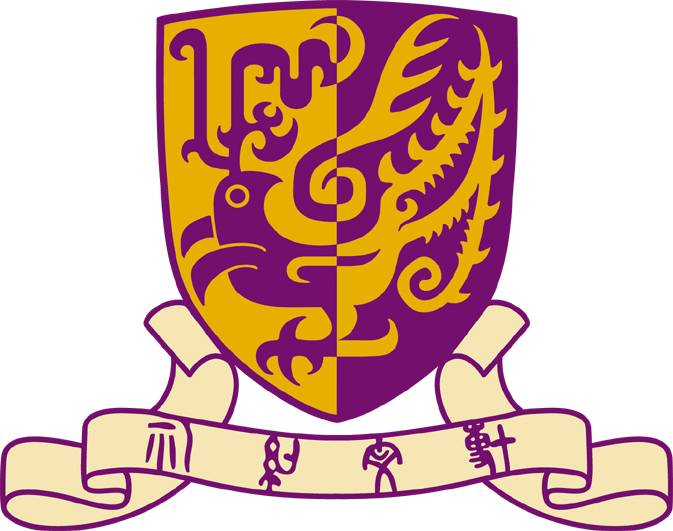2023年12月11日
2023 CUHK Anthropology Department Summer Fieldtrip
Seoul, South Korea
15-24 June 2023
Sealing Cheng: The annual Anthropology Department summer fieldtrip finally resumed in 2023. After the Korea trip I was supposed to lead got cancelled because of MERS (Middle-East Respiratory Syndrome) in 2015, I was nervous about this post-COVID trip. Luckily, we made it out of Hong Kong!
The goal of the trip was to share my work on sexuality and nationalism in South Korea with students. I designed the trip – including pre-trip seminars, visits to NGOs in Hong Kong – to give students a sense of the politics of sex work, and how issues of gender and sexuality are intimately tied to the history of colonialism and militarism, and how debates about nationalism continuously shape one’s sense of self as a Korean.
But nothing could prepare them for the actual interactions with people whose lives they had read so much about. There were two major highlights during the trip: The overnight trip on Kangwha Island with the onnis, in which most students who could not speak Korean had to learn to communicate through non-verbal means, as they took walks, ate, and danced with the older Korean women, and the visit to the U.S. Military camptown in Tongducheon and one of the clubs with an onni who used to work in the camptown for decades.
Below are excerpts from the students’ reflections after the trip. In my not very humble opinion, the sensitivity and nuanced reflections conveyed below made all our hard work worthwhile.
How is nationalism gendered? How are everyday gender and sexuality struggles entangled with broader histories of colonialism, militarism, and nationalism?
Joyce Leong: In the War Memorial Museum, an exhibition named “Fading Voices” focuses on victims conscripted during Japan’s Meiji Industrial Revolution. It tries hard to show the sufferings of Korean men during that period, as most of them were coerced into migrating and trapped in debt and harsh conditions. A narrative of Korean masculinity as one of sacrifice and endurance is constructed. On the other hand, the Women’s War and Human Rights Museum provides a stark contrast, as it highlights the experiences of women during wartime. It focuses on the topic of comfort women and provides an important counterpoint.
Fangying Guo: In the Women’s War and Human Rights Museum, it became evident how the history of colonialism has shaped societal attitudes towards gender, a discourse further complicated by the enduring presence of the US military, gender imbalances, socio-economic disparities, and the stigma surrounding sex work. Questions of how to address the rights and protection of sex workers within the nation’s troubled past, and whether historical trauma can legitimize currently marginalized and unprotected groups of women involved in sex work, came to the fore.
John Ma: The ongoing war with North Korea seems to be a political issue and it has close ties to nationalism in Korea. The subsequent conscription for men due to this war also gave rise to patriarchy in the society due to the self-reaffirmation of being in the army for men and respect for serving the country from other parties in the society. In turn, this patriarchal thinking acted against the feminist movement in Korea. Everything is intertwined, and to touch on one issue, it is almost certain that all of the web will be affected.

Visit to the Demilitarised Zone
What is ethnographic fieldwork? What happens when you meet people whose lives are so much more than material for analysis?

We were treated to a sumptuous breakfast by our host, Magdalena House, the first Korean NGO founded to support women in prostitution.
Vicky Hui: Before the trip, I just knew that the sisters were a group of retired sex workers, yet they were almost strangers to me. However, after being comforted by one of the sisters, I felt a sense of familiarity that reminded me of my grandmother washing my hands and talking to me when I was a child. Although I could not understand her language, I could feel her kindness and care. In that moment, I felt emotionally connected to someone from a different cultural background. I realized that they are not too different from people we encounter in our daily lives, as they also age, plan for retirement, and enjoy singing and dancing.
Linus Kwong: Friendships are constructed through times of everyday interaction, like what we have done together with the imu: going to the market, eating, and dancing together. Also, the time we spent waiting for the bar owner in Tongducheon is frustrating. That was a stuffy hot day, we had walked for a long time, and we waited for almost an hour. But that experience does remind me that waiting is also a part of doing research. If our objective is to understand a way of life, a different way of relating to the world, to each other, then the waiting becomes a pathway to understanding. When we always say that we love anthropology because of its emphasis on our engagement with the interlocutors’ lives, I think that these experiences have gladly reminded us of our faith in the discipline we chose.

Meeting with Prof. Jang Jung-a, Miss Yoon Chae-yong, and Mr. Kim Hansol in Insadong (followed by Michelin-recommended dumplings!)
Shakira Li: 但觀察與凝視是不一樣的,觀察是謙遜的、向人學習的,凝視是暴力的、以自我為中心的。有時覺得把我們遇上的人稱之為informant或interlocutor都顯得過分功利,彷彿我們接近他們的唯一目的就是為了收集研究用的資料而己,可是,沒有一定的情感紐帶和感情基礎,我們遇見的人又怎會輕易地透露一些真實的經歷,而我們又怎能對感興趣的事情有更真實的掌握呢?發現人類學研究與其他社科研究不同,許多社科研究講究真實,其實就是講究真偽、講究數據、講究工具理性,人類學講究真實,是講究不可量化的經驗與情感。我們閱讀,不是為了以一個大敘事去凌駕眼前現象,而是為了在觀看現象時不要被現象迷惑,從而看得更加清楚。
Jolin Li: The onni in the blue dress who had danced with me walked over to the piano and began pressing the keys with a single finger…This figure reminded me of my grandmother with a slightly hunched posture, and countless beautiful elderly women I had seen on the street…Anthropologists may enter a field to study a certain group of people with a certain characteristic they possess (such as sex workers, factory workers, or LGBTQ+ individuals) and attempt to connect that characteristic to a broader historical narrative and context…However, leaving aside all the representations of sex workers and all other people, they are human beings with humanity… What is anthropology for? After this field trip, one possible answer for me is to see humanity and to convey humanity.
What can be learnt from “uncomfortable” experiences, uneasy encounters and intersubjectivity?
Mini Fung: During our tour at Tongducheon, we visited a bar. Unfortunately, I got a headache and felt exhausted due to the heat during the tour. I just felt like lying on the couch. But after Yongkeong Onni grabbed me up, I joined the chat and found myself feeling better than I thought. After the chat, the entertainers and my fellows started to dance. Again, I gave myself an excuse and sat back on the couch. Yongkeong Onni grabbed me to the dance floor and danced with me. Although I am not used to dancing in front of the crowd and having fun in a bar, I found it was not that difficult and awkward. It was still embarrassing, but also a unique experience that I should cherish. When we were taking the subway back to Seoul, Yongkeong Onni had to get off earlier. She gave each of us a hug before leaving. While I do not hug much even with close ones, I could feel the connection between Yongkeong Onni, although we had just met for a short time.

Visit to Korean Sexual Minority Culture and Rights Center
Florian Zhang: I am never a good dancer. Growing up in a small Chinese town where dancing had never been a “normal” choice for entertainment or sociality, I moved my body awkwardly. Nervous and embarrassed, I could not help thinking, “What am I doing here?” The uneasiness and wish for avoidance occupied my mind…What distinguishes anthropologists from natural scientists in the labs and other social scientists staring at statistics and charts might be primarily such uneasiness. It is the attempt to build interpersonal relations, to engage with other lifeworlds, and to invite a limited but mutual openness. In the more consistent efforts to build such connections with others, the fieldworker would find their agenda-setting power lost. Their habitual ways of living and personal preferences of communication would be challenged, and the process of research would be beyond their control. Anthropologists may find the possibility and even responsibility of actions. In those actions, the anthropologist is not a leader, but only a beneficiary from and contributor to the mutual care with others, made possible by working, laughing, and crying together.

Final Debriefing on the last day – Beer and Fried Chicken; A lot of laughter and even some tears!
Beyond the fieldtrip
Some students took the initiative to visit other relevant sites.
Sining Liu, observing the weekly demonstration in front of the Japanese Embassy: Those standing in front of the comfort woman statue were not asking for Japan’s apology and reparation to the halmeonis (grandmother). They use the comfort woman as a symbol of historical injustice and call out President Yoon for accepting Fukushima water with nuclear contamination. In their 5-minute speech, no details of individual halmeoni’s suffering and appeal were included, and they keep mentioning this historical fact and protest against Yoon’s betrayal of the country. Whereas the exploited women in the 20th century had nothing to do with the water contaminated by Japan, they were deployed as a symbol of patriarchal nationalism, and we don’t know when further victimization will come to an end.

Visit to Centre for Sexual Health and Reproductive Justice (SHARE)
Pei Yu, visiting Yongsan, where the former red-light district was:
Seeing completely no trace of the past existence of the red-light district, I felt deeply sorrowful at that moment. And all the feelings and thoughts I accumulated in this fieldtrip flooded my mind in an instant, weaving my experience in the fieldtrip together. Through the fieldtrip, we went to so many places and saw how the streets and buildings were demolished and rebuilt into new ones, creating a completely different street image. We saw the closed shop in Itaewon, the streets in transition period in Dongducheon, and the Miari red-light district that had shrunk many times. There are also streets in Paju trying to get rid of sex workers, and in Yongsan that have already been changed into an entirely different look. The government hope to change the red-light district into new modern buildings, control the body and sexuality of women, and erase the “wrong collective memory” regarding sex work.

Visit to “I am Spring” Center for Young Women
Acknowledgements
Sealing Cheng: The very fruitful trip could not have been possible without the very generous help of our interlocutors who shared their time, wisdom, and personal stories, and who showered us with love and care. I dedicate my heartfelt thanks to them here. In Hong Kong, Midnight Blue and Action for Rearch Out gave students important lessons on sex work and sexuality-related issues. There are a lot of people to thank in Korea: First of all, our host The Magdalena Collective (especially Big Sister Lee Ockjeong, the Pandora Project members, and members of the Courageous Women Research Center: Prof. Kim Aeryung, Prof. Lee Hee-young, Dr. Won Mihae, and “I am Spring” Education Center for Young Women). Then there are different organizations and individuals: Korean Sexual Minority Culture and Rights Center, ChaCha (Sex Workers’ Rights Activists), SHARE (Center for Sexual Health and Reproductive Rights), Center for Women’s Human Rights, Ms. Back Jaehee, Yongkyong Onni, Prof. John Cho (University of British Colombia), Prof. Todd Henry (University of California, San Diego), Prof. Li Jee-un (Yonsei University), Prof. Jang Jung-a (Incheon University), Mr. Kim Hansol, Miss Yoon Chae-yong, Minki Hong, and Harry Leung. I apologize for anyone I have missed here. I also want to thank Ted Lee, our alum, who took time off from his work to serve as teaching assistant for the trip (and drew effectively from his military training to manage the group!).

